Princess Pa in Vienna – through the lens of a fellow diplomat
Princess Pa in Vienna – through the lens of a fellow diplomat
วันที่นำเข้าข้อมูล 30 Mar 2023
วันที่ปรับปรุงข้อมูล 30 Mar 2023
Princess Pa in Vienna – through the lens of a fellow diplomat
Sun Thathong
I first became involved in Princess Pa’s work when I joined the Ministry of Foreign Affairs in 2009. I was assigned to be part of a team campaigning for the “Bangkok Rules on the treatment of women prisoners and offenders” to be adopted by the United Nations General Assembly. It was to be a culmination of a project Princess Pa was professed to be passionate about. I recall being up until three in the morning in Brazil, defending the inclusion of a paragraph on these draft Bangkok Rules in the outcome document of the Twelfth Crime Congress in 2010. This would later pave the way for the successful adoption of the rules later that year in New York. At that time, I learned a great deal about her personal motivations and efforts behind the initiative. Her sense of justice made a strong first impression on me.
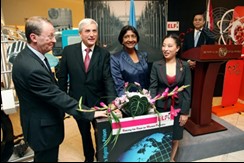
Princess Bajrakitiyabha at the 12th session of the Human Rights Council
September 2009, Geneva
Source: Jeff Hoffman, UN
A year after the Bangkok Rules were adopted, I took leave to pursue a law doctorate in the United Kingdom. It was not until I returned and was posted to Austria in 2018 that I re-encountered Princess Pa’s work. But this time, it was the fruits of her labour in her capacity as a Vienna-based ambassador during 2012 – 2014.
Two years is considered a relatively short time for a posting, but it was enough time for her to leave a lasting imprint. And throughout my four years in Vienna, I came to admire her as a model lawyer-diplomat, whose passion for justice and the rule of law served Thailand’s interests in many significant ways. From a practitioner’s perspective, I have found this to be deeply inspiring.
Princess’ Road to Vienna
Before arriving in Vienna, I had often wondered how, at such a young age, Princess Pa would handle the job of being Ambassador of Thailand to Austria, Slovakia and Slovenia, and Permanent Representative of Thailand to the UN and other Vienna-based international organisations. How would she handle looking after more than 6,000 Thai people in three countries and simultaneously representing Thailand in several international organisations? To say that the job was demanding is an understatement and some would say it should have required decades of experience in diplomacy.
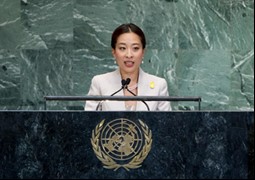
Princess Bajrakitiyabha addressing the UN General Assembly’s High-Level Meeting on the Rule of Law,
24 September 2012, New York.
Source: UN
In my view, having a law doctorate from Cornell, a distinguished career as a Thai lawyer-prosecutor, and prior experience working at the Thai Permanent Mission to the UN in New York, actually prepared her in more ways than one when compared with other fellow, career diplomats.
Then I realised one very important factor. Being born a public figure, Princess Pa naturally underwent ‘diplomatic training’ since birth. Moreover, as a member of the Royal Family, service to her people and compassion for their trials and tribulations was in her blood. The UN had already recognised her skills in diplomacy when it named her UN Women National Ambassador to Thailand in 2008. The successful adoption of the Bangkok Rules back in 2010 was also in part the result of her appreciation of and skills in multilateral diplomacy.
Princess Pa had already mastered a diplomat’s essential skills some time before coming to Vienna. This explains why, despite her relatively short tenure as Thai Ambassador and Permanent Representative in Vienna, she was able to make such remarkable contributions, advancing Thailand’s national interests and multilateral diplomacy.
Leading the leaders
A permanent representative’s main task is to represent their country and promote its interests at international negotiations. Some may take on extra, voluntary roles in conducting meetings and chairing decision-making bodies of these organisations. I was astonished to learn that, while she was in Vienna, Princess Pa personally took on a long list of these voluntary leadership positions in several fora.
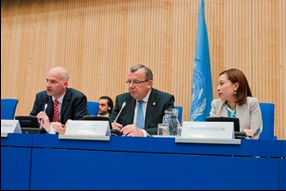
Princess Bajrakitiyabha chairing the 21st session of the Commission on Crime Prevention and Criminal Justice in Vienna, 23 – 27 April 2012
Source: UNODC
For the Commission on Crime Prevention and Criminal Justice, a UN body dealing with crime prevention and criminal justice matters, Princess Pa served as chair of its annual session from 2011 to 2012. For the Commission on Narcotic Drugs, a UN body dealing with drug-related matters, she served as second vice-chair of its 2013 annual session and as first vice-chair the following year. For the International Atomic Energy Agency, an organisation that seeks to promote the peaceful use of nuclear energy, she served as vice-president of the 2013 annual session of the Agency’s General Conference. She also served as vice-chair of the inaugural session (2012) of the General Assembly of the International Anti-Corruption Academy, an institution that promotes anti-corruption education.
I had seen other Thai permanent representatives performing similar roles and have been part of the team serving them, but I never heard of a single permanent representative taking on such a long list of roles over such a short period of time.
Indeed, being elected to these positions, one after another, was testament not only to the trust that the Viennese diplomatic circles placed in Princess Pa, but also to her incredible work ethic and competence. In discharging the above positions, she helped build bridges, resolve tensions and advance common goals. In doing so, she raised not only Thailand’s profile, but also the profile of the organisations themselves.
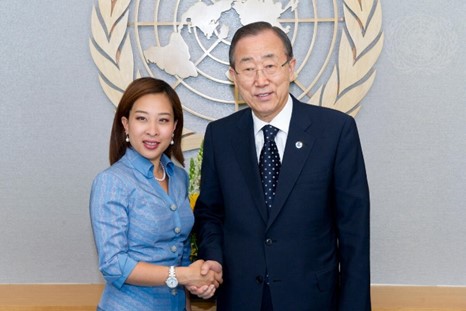
Princess Bajrakitiyabha met with the UN Secretary-General during the UN General Assembly’s Thematic Debate on ‘Drugs and Crime as a Threat to Development,’ 26 June 2012, New York
Source: UN
Influencing the global agenda
Princess Pa also sought to widen Thailand’s influence in other ways. One was to make Thailand better known as a hub of international meetings. At the first session of the General Assembly of the International Anti-Corruption Academy in 2012, she conveyed Thailand’s offer to host the Assembly’s second session in Thailand the following year, an invitation that the Assembly gladly accepted. Then in 2014, Thailand hosted two UN meetings chaired by Princess Pa herself – a preparatory meeting for the 13th Crime Congress and an expert group meeting to develop draft model strategies and practical measures on the elimination of violence against children.
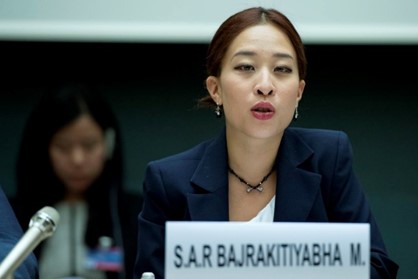
Princess Bajrakitiyabha at the ECOSOC panel discussion on crime prevention in the context of post-2015 development agenda, 22 July 2013, Geneva
Source: Jean-Marc Ferre. UN
Another manner in which Princess Pa widened Thailand’s influence was through actively engaging with relevant actors in promoting Thailand’s causes. In 2013, Princess Pa joined a panel discussion on crime prevention in the context of the post-2015 development agenda at an ECOSOC meeting in Geneva. Later in 2013, on the margins of the UN General Assembly’s annual session in New York, she moderated a high-level panel discussion on gender-related killings of women and girls. She also met with the Deputy UN Secretary General to discuss issues related to the rule of law and sustainable development. Outside the UN, she delivered speeches at meetings of the Organization for Security and Cooperation in Europe (OSCE), where Thailand is a partner country, to share Thailand’s experiences in promoting the rule of law, sustainable development, and women’s empowerment.
Achieving concrete outcomes
In less than two years, more than ten resolutions proposed or co-proposed by Thailand were successfully adopted by Vienna-based UN bodies. During 2013-2014, the Commission on Narcotic Drugs adopted five resolutions proposed or co-proposed by Thailand on matters such as alternative development and prevention of drug abuse. During the same period, the Commission on Crime Prevention and Criminal Justice adopted eight resolutions proposed or co-proposed by Thailand on matters such as elimination of violence against children, treatment of prisoners, and criminal justice.
This high number does not in itself indicate unprecedented achievements, given that it is common for Thailand to propose and co-sponsor a few (or more) resolutions at Vienna-based international organisations each year. It does show, however, that under Princess Pa’s ambassadorship, Thailand continued to be proactive and perform well in Vienna. It is also worth noting that it was during Princess Pa’s ambassadorship in Vienna that Thailand finally ratified the UN Convention against Transnational Organized Crime and its anti-human trafficking protocol, having been their signatory for more than a decade.
It would be misleading to conclude that Princess Pa initiated and accomplished all the above tasks by herself. The crucial supporting roles of her staff who helped to propose agendas, draft speeches, and lobby for support should not be overlooked. But it would also be naïve not to acknowledge the unique persuasive power that Princess Pa had over her counterparts, both domestic and foreign.
An inspiration for all
Princess Pa left Vienna and returned to the Thai Attorney General’s Office in October 2014. She has since then taken on even more roles such as the UNODC Goodwill Ambassador for the Rule of Law in Southeast Asia, and carried on with her royal duties and personal passions. On reflection, I cannot help but think of Prince Wan Waithayakon – one of Thailand’s greatest diplomats and Princess Pa’s own first cousin thrice removed – who presided over the UN General Assembly in 1956. They are known for having a similar grace, compassion, and competence. But while Princess Pa has stepped off the path of a career diplomat for now, she has already cemented her place as a role model for the new generation of diplomats, and remains a symbol of empathy and justice and a source of inspiration for all.
* * * * *
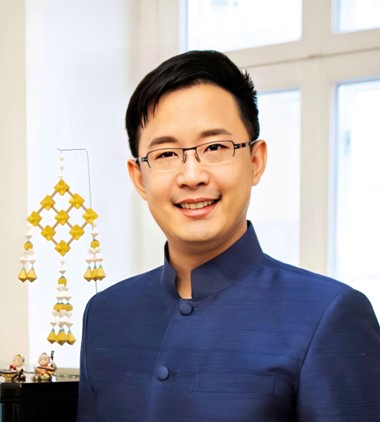
Sun Thathong is a Thai lawyer-diplomat, currently serving as Counsellor at the Department of Treaties and Legal Affairs, Ministry of Foreign Affairs of Thailand.
He previously served as First Secretary at the Royal Thai Embassy and Permanent Mission of Thailand in Vienna (2018-2022).
สถานเอกอัครราชทูต ณ กรุงเตหะราน
Office Hours: Sunday to Thursday, 08:30-12:00 and 13:00-16:30 (Except public holidays)